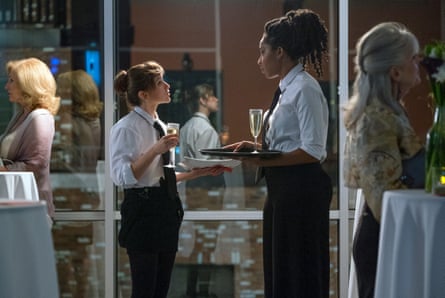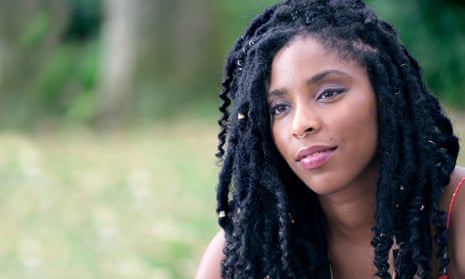“I would literally rather have my period non-stop for a thousand years than have this portion of the conversation.” It’s fair to say that Jessica James’s Tinder date could be going better. So, as a playwright, she rewrites the script for the guy she’s just met. Why doesn’t he whisper something sexy instead of acting so formal, she asks. When her ex walks into the bar, she turns director to adjust the scenario and stir maximum jealousy. It’s an irresistible opening scene in a romcom that revels in awkward encounters.
What I love about The Incredible Jessica James, which was picked up by Netflix after it closed the Sundance film festival in 2017, is that it crackles with the energy and passion that drives the best theatre. Playwrights in films are so often introspective, tortured mumblers; their scripts worthy, dry or ridiculous. They are simply never this cool. Jessica, played by the super-charismatic comedian Jessica Williams, is a live wire. Witness the all-dancing title sequence in which she shimmies through her New York apartment up to the rooftop.
The film, written and directed by Jim Strouse, is as much about Jessica’s relationship with theatre as with her ex, Damon (Lakeith Stanfield); her new partner, Boone (Chris O’Dowd); and her best friend, Noël Wells. Jessica loves reading, watching, making and teaching theatre, she says, but the rejection letters pinned to her wall lead her to ask: does it love her back?
The same question is asked by another playwright of colour, portrayed by Radha Blank, in last year’s brilliant The 40-Year-Old Version which was also a Sundance hit. A patronising white producer who questions the authenticity of her latest script tells Blank’s character “theatre misses you!” after she’s been waiting years to get a new play on stage. She delivers blistering raps to express her disillusionment with an industry full of compromises and closed doors. Jessica, 15 years younger, is at a stage in her career where she is thrilled to receive a personalised rejection letter rather than a stock response.
The handful of references to real-world US theatre in the film include a cameo for Tony award-winning writer-performer Sarah Jones, who takes part in a writing weekend with the children Jessica teaches at a non-profit workshop. We see the chain of mentorship that runs through theatre: Jones is an inspiration for Jessica, who in turn motivates her young class, especially Shandra (Taliyah Whitaker) who creates a “scene about nothing” inspired by the invisibility she feels amid her parents’ divorce. Jessica and Jones share a brief but realistic conversation that pinpoints how, when and if you can ever “make it” as a playwright and what success looks like, beyond awards and acclaim.
“This is your one and only life,” Jessica tells the kids. “What do you want to tell people about it?” Some critics questioned why Strouse’s film doesn’t tell us more about Jessica’s own work. We see posters but never scenes from her plays (though, of course, she is unproduced in New York as we keep hearing). But we are duped into believing episodes that are in fact playing out in her head – the suggestion is always that she has a wild imagination and writes from the heart.

Strouse explores the paradox that writing plays for a future audience is also an intensely private, personal business: Jessica and Boone go to bed on their first date but she recoils at the idea of him reading her plays. It’s too intimate. When she later hands over a binder of every script she’s written, it’s evidence that she has accepted him into her life. In a neat juxtaposition, Boone – who knows nothing about theatre – has developed an app that generates generic messages for you to keep in touch with your family so you don’t need to bother to write them yourself. Jessica’s relationship with her own family back in Ohio is explored in an excruciating home trip where she feels a sense of disconnect in every situation but none more so, perhaps, than when her family are gripped by a romance on TV with laughably generic dialogue.
The film drew comparisons with another 2017 romcom, The Big Sick, in which Kumail Nanjiani plays a standup who – like Jessica – is in an interracial relationship but whose blossoming romance brings cross-cultural conundrums that take centre-stage. Strouse has said his romcom is “foremost a fun, joyful movie about love”; he doesn’t dwell on the prejudices of the US stage industry as explored in The 40-Year-Old Version and decried so urgently by the recent We See You, White American Theater movement. But there are a couple of exceptions, such as when Jessica takes a waitressing gig at a $500-a-head soiree with a haughty clientele described as “old money, theatre-subscribing Manhattan”. One of the biggest laughs comes when she is back in Ohio and asked to recommend a Broadway show to her mum’s friend. “Theatre is in a really troubled state in America right now,” Jessica opines. “Most things are trash. You’d be surprised at who they allow to do shows on Broadway.” As her mum glowers, she changes tack. How about Cats, Jessica offers with a glimmer of dutiful enthusiasm. “It’s supposed to be … good.”
For Jessica, theatre is about lighting the spark that she fails to find in that ill-fated opening Tinder date. The zinger about a 1,000-year period came from Williams herself, who is a gifted comic and, like co-star Noël Wells, excels at improv. One of the film’s treats is a scene where the pair of them inspire schoolkids by playing the improv game “Yes, And”. That same quick wit and connection crackles through the whole film.

Comments (…)
Sign in or create your Guardian account to join the discussion